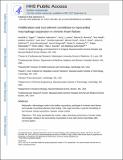Proliferation and Recruitment Contribute to Myocardial Macrophage Expansion in Chronic Heart Failure
Author(s)
Sager, Hendrik B.; Hulsmans, Maarten; Lavine, Kory J.; Moreira, Marina B.; Heidt, Timo; Courties, Gabriel; Sun, Yuan; Iwamoto, Yoshiko; Tricot, Benoit; Khan, Omar Fizal; Dahlman, James E.; Borodovsky, Anna; Fitzgerald, Kevin; Anderson, Daniel Griffith; Weissleder, Ralph; Libby, Peter; Swirski, Filip K.; Nahrendorf, Matthias; ... Show more Show less
DownloadAccepted version (2.725Mb)
Terms of use
Metadata
Show full item recordAbstract
Rationale: Macrophages reside in the healthy myocardium, participate in ischemic heart disease, and modulate myocardial infarction (MI) healing. Their origin and roles in post-MI remodeling of nonischemic remote myocardium, however, remain unclear. Objective: This study investigated the number, origin, phenotype, and function of remote cardiac macrophages residing in the nonischemic myocardium in mice with chronic heart failure after coronary ligation. Methods and Results: Eight weeks post MI, fate mapping and flow cytometry revealed that a 2.9-fold increase in remote macrophages results from both increased local macrophage proliferation and monocyte recruitment. Heart failure produced by extensive MI, through activation of the sympathetic nervous system, expanded medullary and extramedullary hematopoiesis. Circulating Ly6C high monocytes rose from 64±5 to 108±9 per microliter of blood (P<0.05). Cardiac monocyte recruitment declined in Ccr2 -/- mice, reducing macrophage numbers in the failing myocardium. Mechanical strain of primary murine and human macrophage cultures promoted cell cycle entry, suggesting that the increased wall tension in post-MI heart failure stimulates local macrophage proliferation. Strained cells activated the mitogen-activated protein kinase pathway, whereas specific inhibitors of this pathway reduced macrophage proliferation in strained cell cultures and in the failing myocardium (P<0.05). Steady-state cardiac macrophages, monocyte-derived macrophages, and locally sourced macrophages isolated from failing myocardium expressed different genes in a pattern distinct from the M1/M2 macrophage polarization paradigm. In vivo silencing of endothelial cell adhesion molecules curbed post-MI monocyte recruitment to the remote myocardium and preserved ejection fraction (27.4±2.4 versus 19.1±2%; P<0.05). Conclusions: Myocardial failure is influenced by an altered myeloid cell repertoire. Keywords: myocardial infarction; hypertropy; heart failure; macrophage; monocyte
Date issued
2016-09Department
Massachusetts Institute of Technology. Department of Chemical Engineering; Harvard University--MIT Division of Health Sciences and Technology; Massachusetts Institute of Technology. Institute for Medical Engineering & Science; Koch Institute for Integrative Cancer Research at MITJournal
Circulation Research
Publisher
Ovid Technologies (Wolters Kluwer Health)
Citation
Sager, Hendrik et al. "Proliferation and Recruitment Contribute to Myocardial Macrophage Expansion in Chronic Heart Failure." Circulation Research 119, 7 (July 2016): 853-864 © 2016 American Heart Association, Inc
Version: Author's final manuscript
ISSN
0009-7330
1524-4571